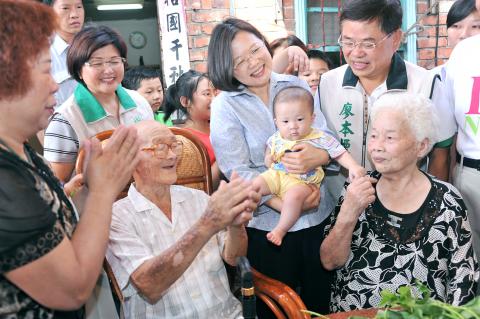The Democratic Progressive Party (DPP) is preparing for a busy week as the party hopes to spark a shift in momentum in its favor for next year’s presidential election.
DPP Chairperson Tsai Ing-wen (蔡英文) is scheduled to unveil her long-awaited China policy tomorrow before the announcement of the 10-year policy guidelines — effectively her presidential platform — which are expected to be approved by the party’s Central Executive Committee meeting the following day.
DPP sources said the announcement of the vice presidential candidate is expected to take place sometime between Wednesday and Sunday’s party congress, which is seen as the first climax of Tsai’s presidential campaign.

Photo: Hsieh Chia-chun, Taipei Times
Tsai still kept tight-lipped about her running mate, saying in response to questions from reporters yesterday morning that “a considerable number of candidates are still in consideration” and that she was consulting party members about the nomination.
The selection process has been very rigorous and is not just a matter of picking “someone that I like,” Tsai said.
Media speculation has continued regarding possible candidates for the position. Former finance minister Lin Chuan (林全), central bank Governor Perng Fai-nan (彭淮南), former deputy premier Lin Hsin-yi (林信義) and former DPP chairman Lin Yi-hsiung (林義雄) have all been tipped as possible candidates.
Speculation has also centered on DPP Secretary-General Su Jia-chyuan (蘇嘉全) and former premier Su Tseng-chang (蘇貞昌), who lost to Tsai in the DPP presidential primary in April.
The DPP is hoping that a series of presentations on the 10-year policy guidelines, which Tsai has been working on for two-and-a-half years, would shift the focus of the campaign back to the policy front.
Tsai’s campaign began the presentations on Tuesday last week, starting with its finance and tax policy, and followed by policies on housing, regional development and education.
The string of press conferences have helped boost Tsai’s campaign, which has been described as “passive,” by dominating public discussions over the past week, forcing President Ma Ying-jeou’s (馬英九) re-election campaign to be on the defensive.
“We believe the policy front will be the most fascinating aspect of Tsai’s campaign. We also believe that the election culture in Taiwan is changing,” DPP spokesman Chen Chi-mai (陳其邁) said.
The DPP is not afraid to present policies that could generate controversy, as long as those policies facilitate meaningful discussions, he said.
Tsai’s China policy could be the most controversial aspect of the policy guidelines as critics have described her past comments on cross-strait relations as “ambiguous.”
Tomorrow, Tsai, who served as chairperson of the Mainland Affairs Council under the former DPP administration, is scheduled to host the China policy presentation, which DPP sources said will consist of two parts — national security and cross-strait economic and trade relations.
However, there will not be too many surprises, the sources said, as Tsai has always believed that cross-strait relations should be part of Taiwan’s engagement in global affairs through a multilateral framework, such as the WTO.

PRAISE: Japanese visitor Takashi Kubota said the Taiwanese temple architecture images showcased in the AI Art Gallery were the most impressive displays he saw Taiwan does not have an official pavilion at the World Expo in Osaka, Japan, because of its diplomatic predicament, but the government-backed Tech World pavilion is drawing interest with its unique recreations of works by Taiwanese artists. The pavilion features an artificial intelligence (AI)-based art gallery showcasing works of famous Taiwanese artists from the Japanese colonial period using innovative technologies. Among its main simulated displays are Eastern gouache paintings by Chen Chin (陳進), Lin Yu-shan (林玉山) and Kuo Hsueh-hu (郭雪湖), who were the three young Taiwanese painters selected for the East Asian Painting exhibition in 1927. Gouache is a water-based

A magnitude 4.1 earthquake struck eastern Taiwan's Hualien County at 2:23pm today, according to the Central Weather Administration (CWA). The epicenter of the temblor was 5.4 kilometers northeast of Hualien County Hall, at a depth of 34.9 km, according to the CWA. The earthquake's intensity, which gauges the actual effect of a temblor, was the highest in Hualien County, where it measured 2 on Taiwan's 7-tier intensity scale. The quake also measured an intensity of 1 in Yilan county, Taichung, Nantou County, Changhua County and Yunlin County, the CWA said. There were no immediate reports of damage or injuries.

‘WORSE THAN COMMUNISTS’: President William Lai has cracked down on his political enemies and has attempted to exterminate all opposition forces, the chairman said The legislature would motion for a presidential recall after May 20, Chinese Nationalist Party (KMT) Chairman Eric Chu (朱立倫) said yesterday at a protest themed “against green communists and dictatorship” in Taipei. Taiwan is supposed to be a peaceful homeland where people are united, but President William Lai (賴清德) has been polarizing and tearing apart society since his inauguration, Chu said. Lai must show his commitment to his job, otherwise a referendum could be initiated to recall him, he said. Democracy means the rule of the people, not the rule of the Democratic Progressive Party (DPP), but Lai has failed to fulfill his

OFF-TARGET: More than 30,000 participants were expected to take part in the Games next month, but only 6,550 foreign and 19,400 Taiwanese athletes have registered Taipei city councilors yesterday blasted the organizers of next month’s World Masters Games over sudden timetable and venue changes, which they said have caused thousands of participants to back out of the international sporting event, among other organizational issues. They also cited visa delays and political interference by China as reasons many foreign athletes are requesting refunds for the event, to be held from May 17 to 30. Jointly organized by the Taipei and New Taipei City governments, the games have been rocked by numerous controversies since preparations began in 2020. Taipei City Councilor Lin Yen-feng (林延鳳) said yesterday that new measures by